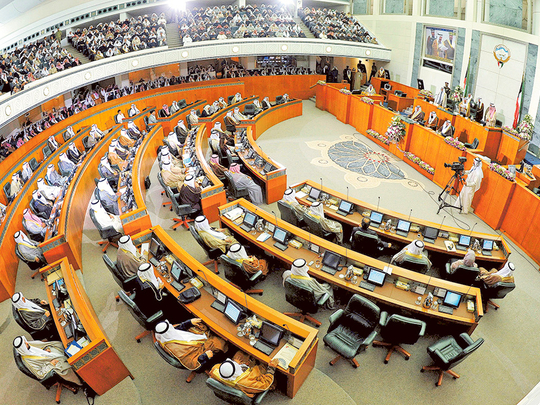
Kuwait City: On Tuesday the Emir of Kuwait, Sheikh Nawaf Al Ahmed Al Sabah, approved the formation of the 38th Cabinet of Minister headed by the Prime Minister, Sabah Al Khaled Al Sabah.
The new cabinet was formed after Sabah Al Khaled’s government resigned last month, almost a month after it was created.
Although Sabah Al Khaled was reappointed prime minister, the new government saw some changes with four new faces out of the 16 appointed ministers. The new appointments are former MPs and technocrats. One of new appointees Abdullah Al Roumi, serving as the Deputy Prime Minister, is seen as a bridge between government and parliament as he was the deputy speaker of parliament and is now part of the government.
While the shuffle was not drastic, some significant changes were made as long time minister Anas Al Saleh, formally minister of interior and deputy prime minister, was not reappointed.
The government continues to be formed from 16 ministers, but some ministers are in charge of two ministries. Although there is no law dictating which ministries are overseen by the a single minister, traditionally similar ministries are bunched together. That is not the case in this current government, as the ministry of education and higher education were separated, with Dr. Mohammed Al Fares was appointed as the Minister of Oil and Higher Education, while Dr. Ali Al Mudaf was reappointed as Minister of Education.
Dr. Rana Al Faris continues to serve as the only female minister, but she has been given a new role, in addition to her previous position as Minister of Public Works, titled Minister of State for Communication and Information Technology Affairs.
The new cabinet will take the conditional oath in front of Sheikh Nawaf on Wednesday. This is the second government to be formed under the new Emir who assumed the position back in September.
Resignation of former government
It has been around a month and half since the government handed in it’s resignation. According to Kuwait’s state media, KUNA, the government handed in their resignation, “in light of developments in the relationship between the National Assembly and the government, and what the national interest may warrant.”
One of the main disputes between the government and the parliament was the motion to interrogate the prime minister.
On January 5, three MPs, Bader Al Dahoom, Thamer Al Suwait and Khaled Al Moanes, put forth a motion to interrogate the prime minister.
A day later, 38 MPs agreed to the interrogation, setting an unprecedented move as it was the first in time in Kuwaiti history that the majority of the MPs favoured a motion before the session even occurs.
Heightened tensions between government and parliament
After the government resigned, several MPs stated that if the government was to re-appoint Sabah Al Khaled as prime minister, they would file a motion to interrogate him again. In addition, many MPs said if certain ministers were reappointed they would also file a motion to interrogate the prime minister.
The new government formation saw some changes signalling that there might be a chance for the tension between the legislative and executive branch to calm down.
All will be clear in a few weeks when parliament reconvenes. There are no parliamentary sessions at the moment, after the Emir issued an Amiri decree suspending parliament for one month back in February 18.








